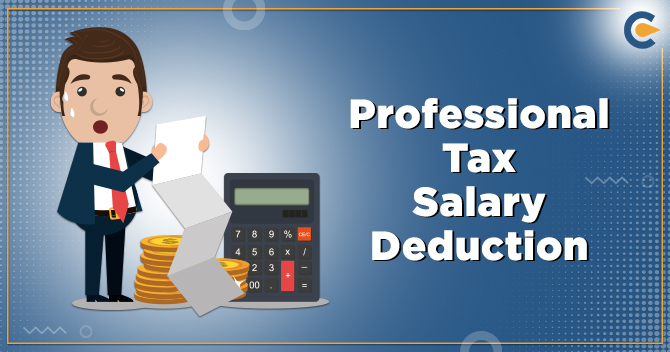Do you know 100% of your salary? All of your deductions and everything else that is paid off before it comes into your hand? Why do you receive a different amount in hand and not the Income mentioned on your payslip? These are too many questions. But they are valid questions. Being on top in terms of financial stability starts with being an expert at your own finances. Be it debt, income, tax, and so much more. You have first got to be a pro at your very own finances. If you know bits and pieces of it or haven't heard of it at all. No worries, you can find everything on it here.
What is Professional Tax?
Professional tax is a special tax charged by state governments on individuals who earn a living through any profession or occupation. Furthermore, you should not take the term "Professional tax" literally and assume that only professionals are required to pay it. Rather it is an umbrella phrase for any tax that someone must pay as a result of their employment in any profession.
This tax must be paid by everyone, including employees and business owners. As a result, the Professional Tax is not limited to doctors, engineers, or lawyers. Every person who lives in a specific state and earns a living is required to pay this tax. Because this tax is levied by the state government, the calculation varies from state to state.
However, the Centre has made it plain that no state can collect more than INR 2,500 in professional tax per year. As a result, the professional tax is withheld from the salaries of many people. Further on, let us look at more about professional tax, the professional tax slab, deduction, and much more.
What is the Professional Tax Slab?
Because each state has its own professional tax slab, here are the tax slabs for India's numerous states and union territories. But let us look at an example, with rates in Karnataka.
● If the monthly salary is
Rs.15,000 and below there is no tax.
● If the monthly salary is more than Rs. 15,000 - it is Rs. 200 per month.
Why is this Tax Different throughout the country?
Professional taxation is the responsibility of state governments rather than the federal government. As a result, no single statute defines how to calculate this tax for the entire country. Rather, each state government has a body that creates legislation for the collection of professional taxes. As previously stated, the centre has simply established the maximum amount that can be collected in any particular year.
As a result, the rest of the rules governing professional tax collection are determined by the different state governments. As a result, each state has its own professional tax slab rates, and the tax is determined in accordance with these slabs. In addition, several Indian states and union territories do not levy Professional tax.
Who collects this tax?
Employers can either collect the tax directly from their employees or deduct it from their monthly salary and pay it all at once. The employer might collect all of these deductions and then pay them all to the state government at once. However, if they fail to do so, they will incur fines even if they have collected deductions from their employees.
Additionally, they have the option of allowing their staff to submit their own Professional tax filings. However, once the payment is collected, the employer must ensure that the relevant Professional tax is paid.
If you are a professional freelancer, you can file your own Professional tax returns by filling out the necessary form. You will be given a registration number once you have registered with the appropriate authorities.
This registration number may be utilized in the future to pay any overdue professional taxes. However, before doing so, such individuals should consult with tax professionals. Certain states offer rebates if the necessary amount is paid in full, and tax professionals will be aware of such rebates.
Now, you are probably thinking - are there any exemptions on this tax? There sure are!
Exemptions
The Professional Tax Rules exempt certain individuals from this tax. The following people are free from paying this tax:
● Parents whose children have a
physical or mental disability.
● Members of the armed forces as
specified under the Air Force Act of 1950, the Army Act of 1950, and the Navy
Act of 1957. Members of the auxiliary troops and those serving in the state are
also included.
● Textile industry employees
(Badli workers).
● Individuals suffering from a
lifelong physical disability (including blindness).
● Women working as agents for the
Director of Small Savings, also known as the Mahila Pradhan Kshetriya Bachat
Yojana.
● Individuals above the age of 65 are also eligible.
Conclusion
If you are a salaried employee - it is important you know about this tax, and it can help you down the road. Apart from that, knowing all of the contents in your salary is a skill move.










